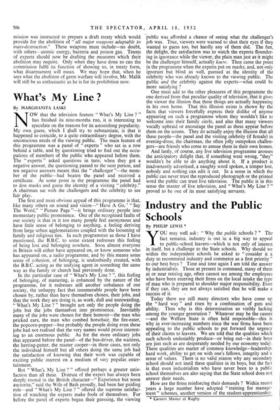What's My Line ?
By MARGHANITA LASKI
NOW that the television feature "What's My Line ? " has finished its nine-months run, it is interesting to speculate on the reasons for its astonishing popularity. My own guess, which I shall try to substantiate, is that it happened to coincide, to a quite extraordinary degree, with the unconscious needs of the viewing public. The main feature of this programme was a panel of " experts " who sat in a row behind a table, and by questioning tried to find out the occu- pations of members of the public who appeared before them. The " experts " asked questions in turn; when they got a negative answer, the questioning passed to the next person, and ten negative answers meant that the "challenger "—the mem- ber of the public—had beaten the panel and received a certificate. At some point in the programme the panel had to don masks and guess the identity of a visiting "celebrity." A chairman sat with the challengers and the celebrity to see fair play.
The first and most obvious appeal of this programme is that, like many others on sound and vision—" Have A Go,' "Say The Word," "Picture Page "—it brings ordinary people into momentary public prominence. One of the recognised faults of our society is that in it too many people feel anonymous and have little sense of belonging to anything, a feeling deriving from large urban agglomerations coupled with the loosening of family and religious ties. In such programmes as those I have mentioned, the B.B.C. to some extent redresses this feeling of being lost and belonging -nowhere. Soon almost everyone in Britain will either have appeared on, or know someone who has appeared on, a radio programme, and by this means some sense of cohesion, of belonging, is undoubtedly created, with the B.B.C. acting as the unifying agent in something the same way as the family or church had previously done. In the particular case of "What's My Line ? ", this feeling of belonging, of mattering, is enhanced by the nature of the programme, for it redresses still another unbalance of our society, the unhappy fact that innumerable people have been chosen by, rather than have themselves chosen, their jobs, and that the work they are doing is, as work, dull and unrewarding. "What's My Line ? " brought not only the people doing the jobs but the jobs themselves into prominence. Inevitably many of the jobs were chosen for their humour—the man who pricked ears, the man who combed horsehair, the fire-eater, the popcorn-popper—but probably the people doing even these jobs had not realised that the very names would prove interest- ing to an enormous public. As for the more ordinary jobs that appeared before the panel—of the bus-driver, the waitress, the herring-gutter, the master cooper—in these cases, not only the individual himself but all others doing the same job had the satisfaction of knowing that their work was capable of exciting public interest on a medium of very popular .enter- tainment.
But "What's My Line ? " offered perhaps a greater satis- faction than all these. Distrust of the expert has always been deeply rooted in the British character—" Experience but noon auctorite," said the Wife of Bath proudly, had been her guiding rule—and "What's My Line ? " offered the supreme satisfac- tion of watching the experts make fools of themselves. For before the panel of experts began their guessing, the viewing -public was afforded a chance of seeing what the challenger's job was. True, viewers were warned to shut their eyes if they wanted to guess too, but hardly any of them did. The fun, the delight the satisfaction was to watch the experts flounder- ing in ignorance while the viewer, the plain man just as it might be the challenger himself, actually knew. Then came the point in the programme when the experts put on masks, and, not only ignorant but blind as well, guessed at the identity of the celebrity who was already known to the viewing public. The public and the celebrity against the experts—what could be more satisfying ?
One must add to the other pleasures of this programme the one derived from that peculiar quality of television, that it gives the viewer the illusion that these things are actually happening in his own home. That this illusion exists is shown by the facts that viewers forcefully express their dislike of anyone appearing on such a programme whom they wouldn't like to welcome into their family circle, and also that many viewers vocally upbraid or encourage the panel as these appear before them on the screen. They do actually enjoy the illusion that all these people—the panel and the visiting celebrity (if female) in evening-dress, the chairman, the often jolly outspoken challen- gers—are friends who come to amuse them in their own homes.
And lastly, of course, any live television programme arouses the anticipatory delight that, if something went wrong, "they" wouldn't be able to do anything about it. If a product is inadvertently advertised, a naughty word spoken, a temper lost, nobody and nothing can edit it out. In a sense in which the public can never trust the reproduced photograph or the printed word the public can trust live television. The public is in this sense the master of live television, and "What's My Line ? " proved to be one of its most satisfying servants.


































 Previous page
Previous page